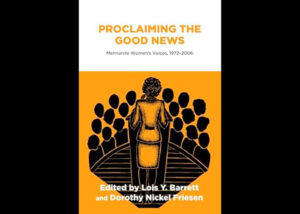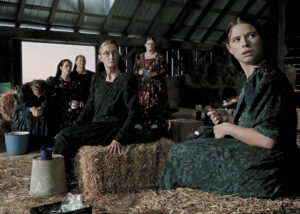Doug Klassen, pastor of Foothills Mennonite Church, Calgary, Alta., served as Pastor in Residence at Canadian Mennonite University in late January and early February 2012. His presentation about the role of men in society at the CMU Monday forum sparked lots of discussion. He reflected further on the topic in a sermon at Foothills Mennonite on February 12, 2012.
This year is the 100th anniversary of the first and only voyage of the Titanic. The captain and crew, trying to show off how quickly they could cross the ocean, went too quickly through a cluster of icebergs. One of them pierced the ship’s hull and it began to sink. As the boat began to go down, the ships’ crew and most of the men on board helped get women and children into the lifeboats first. Since there was not enough life-preserving equipment, many men and all of the crew went down with the ship. That is what men did. They were the guardians and protectors of women and children—that is part of what it meant to be a man up until and including the early 1900s.
This was mentioned hundreds of times in the news story surrounding the sinking of the Costa Concordia. The captain, trying to show off how close he could get to the shore, got too close and a rock from the shoreline pierced the hull and it began to sink. As the boat began to go down, some of the ship’s crew and a good number of the men on board began to push women and children out of the way to get into the lifeboats and get to safety. Many men no longer considered themselves the guardians and protectors of women and children.
Is this what it means to be a man today? What has happened to men in the last 100 years—even the last 50 years? There have been huge changes. We see it illustrated in the media as well.
Male role models of yesterday
How many of us grew up watching the show “Leave it to Beaver?” The Cleavers were the 1950s All-American family where each person had a role. In this fictional suburban family, Father, Mother and two sons live a very traditional existence. The father goes off to work every day in a suit. The mother does not work (as they said back then) but raises the two boys and tends to all the needs of the household, wearing a dress, heels, and often an apron. It is from that era that we get the saying, “Just wait till your father gets home,” and the telephone solicitor asking, “May I speak with the man of the house?”
Until the 1950s and early 60s, men had a prescribed role. They were the bread-winners of the house; they got to work early, supported wife and children, were admired for their decisive attitudes, and made all the major decisions.
Over time though, the ground began to move beneath our feet. By the 1990s when Robert Bly wrote his book, Iron John: A Book about Men, he began by saying, “We are living at an important and fruitful moment now, for it is clear to me that the images of adult manhood given by the popular culture are worn out; a man can no longer depend on them.
“By the time a man is 35 he knows that the images of the right man, the tough man, the true man, which he received in high school do not work in life. Such a man is open to new visions of what a man is or could be.”
I think our culture has realized this. And what often happens in our culture when something becomes uncertain? We poke fun at it. A while ago we began poking fun at men.
The Ward Cleavers, the Jimmy Stewarts who were the models of manhood began to disappear and some new models began to appear. Who have become the new role models, generally speaking, for men in our society over the last 20-30 years?
Contemporary male role models
Maybe the most popular, and certainly the most vocal about men’s issues in the last 20 years is a character we know as Homer Simpson. He has come to be a defining character for an aimless man. He does not go to work early, but sleeps on the job when he gets there. He is forever shirking his responsibility, except for the commitment he feels to get to the bar every night. And he wants this for his son too. In one episode he is disagreeing with what his wife is saying to their son, Bart. Homer says to her, “Marge, don’t discourage the boy! Weaseling out of things is important to learn. It’s what separates us from the animals! Except the weasel.”
In a different episode, during one of those poignant father/son moments he says to Bart, “I want to share something with you: The three little sentences that will get you through life. Number 1: Cover for me. Number 2: Oh, good idea, Boss! Number 3: It was like that when I got here.”
Homer is a symbol of a man who has abdicated responsibility and just tries to find his way through life under the radar, hoping that his wife will shoulder the responsibilities. Close behind him would be Peter Griffin of Family Guy, and to a degree, Ray Romano, Jim Belushi, Tim Allen, and many others, all who have played bumbling or even buffoon-type characters alongside their sensible, responsible, over-burdened wives. You find this even in the Berenstain Bears children’s books, for crying out loud.
That is the one expression of how men are portrayed. The other prominent expression comes from men like Arnold Schwarzenegger, Vin Diesel, Chuck Norris, Russell Crowe. They play the image of the fighter/warrior who is out of touch with most of his emotions, except his anger toward a villain and maybe his weakness for the beautiful but frail and melancholy woman that he seems to attract. To them, life is like a sport, or a fight.
In the movie, Any Given Sunday, Al Pacino has a famous locker-room speech that illustrates it. He says, “In either game—life or football—the margin for error is so small. I mean, one half a step too late or too early and you don’t quite make it. One half second too slow, too fast and you don’t quite catch it. The inches we need are everywhere around us. They’re in every break of the game, every minute, every second. On this team we fight for that inch. On this team we tear ourselves and everyone else around us to pieces for that inch.”
Arnold Schwarzenegger said, “For me life is continuously being hungry. The meaning of life is not simply to exist, to survive, but to move ahead, to go up, to achieve, to conquer.” There are other portrayals of men, but I think these are the two major stereotypes.
Many are left confused
My vantage point in this topic comes from my work as a pastor. I lead a very interesting life and interact with all kinds of men. Most weekday mornings I am in my neighbourhood gym at 5:30. Most of my friends there would fall into the category of being a “man’s man.” When you are there at 5:30, you are not there to fool around. The guy that I train with carries in over 300 lbs. of his own weights every morning because what the gym has is not heavy enough. We egg each other on, we provoke each other, we do talk about serious things, but just in small sound bites—I mean, we are guys.
Throughout my day I see men that are right across the spectrum. I see men who still get excited about strength, endurance and pushing the limits. I see men that push against the bad weather or other obstacles in their work. And I see men who seem to be emasculated, stripped of their role, their voice, even their personhood. And I see and visit with men everywhere in between.
I would say that, of all of the men that I train with, or visit with, or counsel, very few of them, feel a deep sense of confidence as to where they are in life and what they are doing. As Robert Bly says, “The male in the past 20 years has become more thoughtful, more gentle. But by this process he has not become more free. He’s a nice boy who pleases not only his mother, but also the young woman he is living with. But inside, things are not good.”
I know for certain that many men are in such a state that they dare not think too much about what is going on inside, for if they do, they might break down, and never get it back together.
David and Absalom’s story
Perhaps a story that could best describe where the modern man is at is the story of David and his son Absalom. This is an ancient story, but it is a story that maybe best illustrates how men have abdicated their roles. It goes like this:
Almost from the start, Absalom had a number of strikes against him. For one thing, he was much too handsome for his own good, and his special pride was such a magnificent head of hair that once a year when he trimmed it, the trimmings alone tipped the scales at three and a half pounds. For another thing, his father King David, was either spoiling him rotten, reading him the riot act or ignoring him. This did not promote stability of character in the boy. Absalom murdered his brother who had violated his sister, and when the old army general Joab wouldn’t help Absalom patch things up with his father, Absalom figured, “Fine, I’ll show you,” so he set Joab’s barley field on fire.
Even with these outrageous acts, all of Israel was entranced with Absalom, so that when he eventually led a revolt against his father, many joined him. On the eve of the crucial battle, his father, King David, was a wreck. He was afraid that he might lose his throne; he was afraid even more that he might lose Absalom. He felt like a failure. The boy was a thorn in the flesh, but he was also the apple of his eye, and before the fighting started, he told the chiefs of staff, till they were sick of hearing it, that if Absalom fell into their clutches, they must promise to go easy on him for his father’s sake. David was feeling so guilty.
During it all, as Absalom was riding his mule through some thick branches of a great oak, his hair was caught in the branches, and he hung there. Joab, whose field he had burned, heard of it, and he and his men ran to finish him off.
When they broke the news to David, his heart broke. When he cried, “O my son Absalom, . . . Would I had died instead of you, O Absalom,” he meant it—from the bottom of his broken heart he meant it, for David felt the guilt of what his boy witnessed in his growing-up years. Absalom was his father’s son.
Though our circumstances are seldom as intense as this story, there are many men who feel as David felt about much of his life. At moments, when we read the Psalms, we see David is on the right track. He wrote so many good things—his heart was in the right place. But at other times we see how David felt about what his life was amounting to in all of this.
What is a godly man?
So it is with men today. They live as if everything is fine, but deep down many know their work is meaningless. They are desperately lonely, they are depraved, and they are afraid of the darkness that is deep inside of them. But what many men fear the most is that someone is going to blow their cover. So to hide it they live passively, even robotically, only to get old and die, holding on to a lot of unfulfilled dreams and deep disappointments.
I wonder sometimes: if you take away from most men their football, hockey and beer, what do you have? You take all that away, and you take away their valium, their drug. And while most at first would be mad, in a short while they would become anxious and even scared.
I have found when talking about this that the men in the crowd began to look stronger. Their posture changed, their eyes became intense. I was touching on stuff that was deep inside of them and I sensed they wanted to hear more.
The women, on the other hand, looked uneasy. Many women have worked at jobs where they were paid less than a man for equal work. Most middle-aged and older women remember a time when the women were the ditzy, flighty small-minded ones on the sit-coms. And the looks of concern I have received told me that they were not interested in any discussion that was going to inspire men to “take control” and “put them back in their place.” It wasn’t until I commended the liberation that has come to women, and said that there needs to be more yet, that the women relaxed and looked less concerned.
So where does this leave us? Are men just doomed to live in limbo—somewhere between the Titanic and the Costa Concordia? One thing that would help us would be to think more intentionally of what it would mean to live as a godly man.
There is a lot of talk circling around in the Christian blogosphere about this. Some writers like Mark Driscoll and John Piper are saying things that, in my opinion, are attempting to subjugate women again. And they are using the language and symbols of aggression. It is causing a lot of concern and some pain.
Biblical role models
What are the good examples for us? There are several places in the book of Acts where Paul acts as a role model, but in his letters to Timothy we see Paul mentoring Timothy and showing him what it meant to be a godly man. In 1 Timothy 6, Paul warns Timothy about those who argue, who talk about meaningless things, and those do not know truth. Paul tells Timothy about the temptation of seeking to be rich, and how that has ruined people. “But as for you, man of God, shun all of this; aim at righteousness, godliness, faith, love, steadfastness, gentleness . . . take hold of what is eternal as you did in your baptismal vows. . . . Timothy, guard what has been entrusted to you.”
In Winnipeg, we talked about this subject off and on all week. I had people giving me books to read. It hit a nerve. May this discussion continue.
Our church has WISK (Women’s Intergenerational: Seniors to Kids) so what about something for the men and boys? Maybe we could start an MBA (Men and Boys Association) at Foothills Mennonite Church where men and boys could get together for meaningful interaction, for fun and activities, and to remind ourselves that we are not to be like Homer Simpson, or Chuck Norris. We are to embody the best parts of Paul, Silas, Timothy, Josiah, Elijah and a host of others, but most of all, we are to be like Christ.
There is many a symbolic Costa Concordia out there, where men need to find a renewed sense of purpose, for the sake of Christ and his Kingdom.
For discussion
1. What role models are boys and young men exposed to today? How well do our families and churches do in providing healthy male role models? Does pop culture provide positive as well as negative images of what it means to be a man? Who were the positive role models of earlier generations?
2. Klassen says that when we are uncertain about something we poke fun at it. Do you agree? Why do you think situation comedies and other television shows poke fun at male characters? What has made Homer Simpson such a well-known character? How much do shows like The Simpsons influence our perceptions of masculinity?
3. What can we learn about relationships from the David and Absalom story of 2 Samuel, chapters 15-19? What are the limitations of taking a male fighter/warrior stance? What biblical characters would provide a better role model?
4. Klassen says that the continuing discussion about male role models through his week at Canadian Mennonite University shows that the topic hit a nerve. Do you agree? What can congregations do to help young








Leave a Reply
You must be logged in to post a comment.